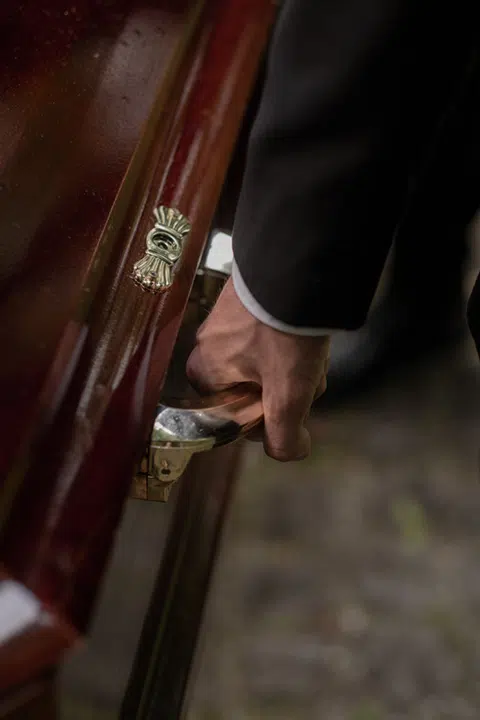The moment of the passing of a loved one is full of emotions and challenges. Also, most of the time, it leaves families with so many decisions to make. Among the most asked questions is when is the time of funeral? When should the funeral take place? The timing may be led by various factors, such as cultural and religious practices, the availability of undertakers, or even family preference.
If you are on a low income or in receipt of government benefits you may eligible financial help with funeral costs. Likewise you may be entitled to the help from a benevolent fund. Proper funeral planning could produce a meaningful and respectful effect to give an excellent time of funeral and farewell to persons who have been exceptional in our lives.
Knowing some of the common timelines and considerations used in this difficult process can relieve much of the stress. Low-cost undertakers can provide a quality service for often considerably less money.
Key takeaways
- Most UK funerals usually take place within two to three weeks of death, although some religions require burial within 24 hours.
- Funerals are more commonly held weekdays and not weekends.
- Weekend funerals are normally more expensive.
- The average funeral service is around thirty to forty five minutes.
- Try and plan a funeral date suitable for the majority of the mourners.
Table of contents
Average time between death and funeral
The average time between death and a funeral in the UK is within two to three weeks following someone’s passing. Here, the required organisation may be carried out: booking an appropriate venue, having the right undertaker, notifying friends and family members, and much more. Of course, the time of funeral is all is subject to availability and other circumstances. In another aspect, funerals may take place sooner because some religious or other laws dictate this.
However, the period between death and the funeral is extended with preservation techniques, such as embalming. It can, therefore, more suitably offer flexibility to families in planning a fitting tribute.
When to plan a funeral for a loved one
Some of the variables that help to determine the time of funeral include ensuring that all the key people are present, such as immediate family members and friends who may have to travel long distances. This will give them time to juggle their programs and make travel plans. Another aspect would be the availability of undertakers, cemeteries, or crematoriums. Places can book up quickly, especially during peak seasons such as winter where more deaths occur.
Significant in this respect are religious and cultural practices. Some rites require a body to be buried within specific time frames, say, within 24 hours, in Jewish and Islamic rites. Other cultures can even allow more extended periods to fulfil rituals and ceremonies.
Lastly, the family’s personal preference and emotional readiness should also be considered. Preparation and grieving time can sometimes be a few days long to provide solace during an already stressful period in life.
Commonly chosen days and times for funerals
Funerals are most commonly held on weekdays, in the morning or early afternoon. These times are chosen for practical reasons to provide enough daylight to complete all parts of a funeral ceremony. This would include time for burial or cremation and any subsequent gatherings or wakes. Mid-morning and early afternoon also allow those who need to travel to arrive on time and not be unnecessarily stressed by traffic and so on.
However, the time of funeral may depend on family choice, religious influence, or the availability of the funeral venue. Weekdays are favoured since they provide more flexibility and less competition for time slots at the cemetery and undertakers. Although it is not as common, weekend funerals do occur; this usually takes place when most guests cannot attend due to work or distance issues.
Ultimately, you should bring a balance by selecting the best day and time for the event, taking into consideration the logistics required, and making the service meaningful and available for everyone.
Can funerals be held on Saturdays or Sundays?
As already said, Saturday or Sunday funerals are possible. However, this event is an added cost for the undertaker, venue hire, and even cemeteries. Therefore, be prepared to pay extra for a weekend funeral. Additionally, there might be limitations regarding availability since other events are happening during the weekends, such as weddings and other ceremonies.
Although this may be so, conducting a funeral on a weekend may help people who prefer this due to travelling or not being able to take time off from work. This allows more friends and family members to be present and pay homage to the deceased. If the time of funeral is to be held on a weekend, inform your undertaker as early as possible to book the weekend day.
How long can you postpone a funeral?
The time one can delay a funeral mostly depends on the treatment of the body. Provided there are proper conditions, an embalmed body will be able to last several weeks or even longer, thus giving greater flexibility in terms of scheduling options for a funeral.
If no embalming is done, refrigeration will be essential to slow down decomposition, generally allowing a delay of up to two weeks or slightly longer. However, this delay of the funeral can take an emotional toll on the family and friends.
In some cases, funerals may need to be delayed for several reasons, mainly regarding the transportation of people who might live far away or the availability of space. Legal formalities can also cause delays in the time of funeral, mainly if an investigation via the coroner’s office is related to a cause of death.
It is always essential to seek advice from an undertaker who may guide you through all procedures to ensure that all necessary steps are followed to protect the body during a postponement.
Average length of a funeral service
This varies. However, the typical funeral ceremony is only thirty to forty five minutes long. This duration allows people to have a meaningful ceremony without being overwhelmed. Undertakers will likely tell you this includes eulogies, readings, musical selections, religious/cultural rituals, etc; the service itself is relatively short.
Although primary services are brief, the overall time of a funeral can be extended due to added portions such as readings from friends and family, and/or graveside ceremonies.
Eulogies and tributes should be a part of the service, as they memorialise the individual’s life and personal experiences. If individual segments become too long, this disrupts the service flow; it shows more respect for the audience if each speaker is brief. A structured program will help keep things moving, possibly coordinated by an undertaker or officiant.
Wakes, separated from the leading service, allow for very informal conversation and condolence sharing as attendees support each other. Usually, an hour to two hours is set aside for these gatherings. This brings relative equality and respect towards a loved one’s memory and time spent reflecting and socialising.
Considerations for scheduling the time of funeral
The scheduling of the funeral would require many things to be considered to come up with one appropriate enough. A solemn factor to consider will have to do with the availability of the place for the funeral rites – the church, chapel, or crematorium. Of course, very early booking should be done to get to the chosen place at the correct time. Secondly, consider the schedules of immediate family members and close friends who should be able to attend.
Of paramount consideration are religious and cultural practices. Some traditions prescribe days or times for funerals, which must be adhered to. Consulting with the spiritual leadership or cultural advisers will help shed light on such matters and help one make informed decisions.
The other essential considerations relate to the geography of where the mourners live. If most mourners are expected to come from far away, adequate notice and a time that most people would find most convenient will help people manage attendance easier.

The weather and season could also be a factor in scheduling. The weather can be hard in some areas, affecting travelling or outdoor ceremonies. Therefore, consider this and maybe switch to a backup plan, such as indoor service instead of a graveside service if the weather is forecast to be poor. Lastly, personal readiness and emotional preparedness: allowing the family enough time to grieve and prepare makes the process more manageable and meaningful.
Time frame for burying a body
The entitlement for the time allowed for burial will vary depending on legal, cultural, and practical factors. Legally, most jurisdictions require that a body has to be buried or cremated within a certain amount of time, usually two to three weeks in the UK. Embalming can extend the time while families make funeral arrangements. If embalming does not occur, refrigeration must be done to preserve the body; generally, as stated earlier this allows for up to two weeks of delay.
Cultural practices are, therefore, greatly affect the time of funeral. Some require the burial to be done as quickly as within 24 hours of death, while others give several days or even weeks to allow the various rites and ceremonies to be performed. Knowing these helps in being respectful and appropriate with a funeral.
Practical time of funeral considerations involve the availability and cost of burial sites, coordination with an undertaker, and compliance with all applicable laws and family or cultural wishes. An undertaker allows ease in attending to all these factors, ensuring everything falls into order. It helps create a time-honoured spiritual ceremony, balancing completing arrangements in good timing and conducting a meaningful ceremony.
Scheduling funerals after death
Funerals are often planned with lots of details to give meaning to the service. First of all, contact an undertaker and consult them for availability about dates and times for booking. For some a home garden or natural burial is something that the deceased requested. These funerals have gained popularity over recent times. Contact as early as possible to avoid conflicts with other services, such as specific religious ceremonies.
Note the availability of significant participants and contact people far enough ahead to have confirmation from everyone that the time of funeral is suitable for all. The timing, determined by legal requirements and cultural practice, sets other logistical elements: travel arrangements and the availability of the chosen venue for the service. It involves a well-organised approach guided by professionals to ensure respectful, timely services.
Conclusion
Planning a funeral is emotional; however, knowing the typical timelines and some key considerations can make things a little easier. Critical components in the time of funeral include how long between death and the funeral and how long the actual service will take, in addition to other specific scheduling details for the time of funeral.
Such a farewell can only be created by carefully considering the following by working closely with funeral professionals: enabling families to develop meaningful goodbyes that reflect their loved one’s life and comfort those left behind. This type of planning will ensure a respectful, dignified tribute that is unique and relevant to the extraordinary life and legacy being remembered.



